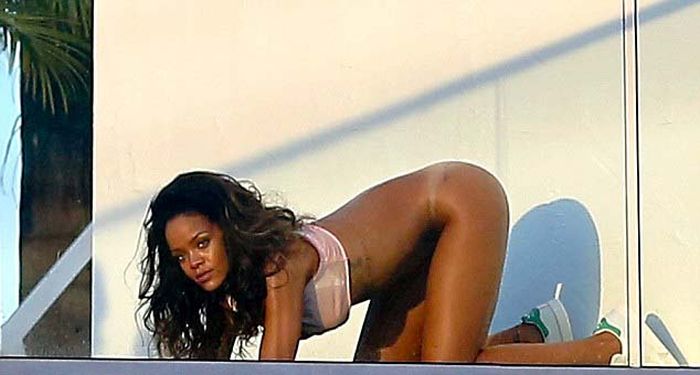Robyn Rihanna Fenty
|
Her music was marketed within the reggae genres because of her Caribbean descent. The album received mixed reviews by music critics. Rolling Stone magazine rated it 2.5 out of 5 stars and described as lacking the replay value, ingenuity and rhythm of the single with "generic vocal hiccups and frills" of US R&B inflecting upon her "Caribbean charm". Sal Cinquemani of Slant Magazine described the album as a "glut of teen R&B chanteuses " and described her lead single "Pon de Replay" as "a dancehall-pop mixture that owes plenty of its sweat and shimmy to Beyoncé's "Baby Boy". A reviewer for Entertainment Weekly commented that the "dancehall/R&B debut is filled with chintzy production and maudlin arrangements that block out the Music of the Sun." The albums second single, "If It's Lovin' that You Want" was less successful than "Pon de Replay", having managed a peak position of number thirty-six in the US, and number eleven on the UK Singles Chart. In Australia, Ireland and New Zealand the single proved to be well-received reaching the top ten in those countries.
A month after the release of her debut album, she began working on her second studio album. The album contained production from record producers Evan Rogers and Carl Sturken who produced most of her debut album, Stargate, J. R. Rotem and label-mate singer-songwriter Ne-Yo. While recording the album, Rihanna served as an opening act for Gwen Stefani to promote her debut album. The lead single, "SOS", peaked at number one on the Billboard Hot 100, becoming her first number-one in the United States. A Girl Like Me was released in April 2006, less than eight months after her debut. The album reached number five on the Billboard 200 selling 115,000 copies in its first week and has been certified platinum by the RIAA, having shipped over one million units. Internationally, the album peaked at number one on the Top Canadian Albums, five on the UK Albums Chart and number five on the Irish Album Chart. The critical response to the album was mixed; Rolling Stone magazine commented "Like her filler-packed debut album, this similar but superior follow-up doesn't deliver anything else as ingenious as its lead single." Critics described the album as a record that almost identically alternates between the sunny dancehall/dub-pop, hip-hop-infused club bangers and gushy, adult-oriented ballads. The second single, "Unfaithful", became a major worldwide hit, reaching the top ten in dozen countries around the world, including the United States where it reached number six on the Billboard Hot 100, as well as topping the charts in Canada, France and Switzerland. The albums third single, "We Ride" failed to reprise the success of the lead single but the fourth single, "Break It Off" featuring Sean Paul, jumped from number fifty-two to number ten eventually peaking at number nine. After the release of the album, Rihanna embarked on her first headlining tour, the Rihanna: Live in Concert Tour. She then embarked on the Rock The Block Tour and then toured with Pussycat Dolls from November 2006 to February 2007 in the United Kingdom. Rihanna also made her acting debut in a cameo role in the straight-to-DVD film Bring It On: All or Nothing, which was released on August 8, 2006.
• 2007–08: Good Girl Gone Bad
With her third studio album, Good Girl Gone Bad (2007), Rihanna wanted to head in a new direction with the help of music producers Timbaland, will.i.am and Sean Garrett, and re-imagine her album compositions with fresh, uptempo dance tracks. She adopted a more rebellious image while recording the album, eventually dying her hair black and cutting it short. Rihanna commented, "I want to keep people dancing but still be soulful at the same time ... You feel different every album, and at this stage I feel like I want to do a lot of uptempo songs." The album topped the charts in countries like the United Kingdom, Canada, Japan, Brazil, Russia and Ireland, and peaked at number two in the United States and Australia. Unlike previous work, the album featured a more dance-pop sound instead of the dancehall, reggae and ballad styles. The album received positive reviews by critics, becoming her most critically acclaimed album at that time compared to her previous efforts.
|
|









